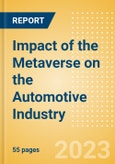Key Highlights
Technologies like AR and VR will also be pivotal for vehicle safety training and testing. By simulating real-world conditions in a virtual space, drivers will be able to practice skills without any of the associated risks. Likewise, original equipment manufacturers (OEMs) will be able to simulate vehicle driving tests with primary driver data, with none of the associated safetyrisks that testing on roads could incur. Real-time digital twins in the metaverse can be used to design, simulate, and optimize new vehicle models, equipment, and manufacturing processes. It can also ensure faster training of automotive staff and create more immersive experiences.
Scope
- The metaverse is a virtual world where users share experiences and interact in real-time within simulated scenarios. It brings together a range of next-generation technologies from cloud computing to artificial intelligence (AI), blockchain, cryptocurrencies, cybersecurity, the Internet of Things (IoT), virtual reality (VR), augmented reality (AR), digital twins, and adtech. While still largely conceptual, the metaverse could transform how people work, shop, communicate, and consume content
Reasons to Buy
- Understand the impact of the metaverse theme for the automotive sector
- Access the latest data on the metaverse theme within the automotive sector
- Identify the leading digital transformation efforts from automotive companies through investment into the metaverse theme
- Access case study insights on leading players within the metaverse theme
Table of Contents
- Executive Summary
- The Metaverse Value Chain
- Foundation layer
- Tools layer
- User interface layer
- Experience layer
- Automotive Challenges
- The Impact of the Metaverse on Automotive
- Case Studies
- Data Analysis
- Market size and growth forecasts
- Mergers and acquisitions
- Patent trends
- Company filings trends
- Hiring trends
- Metaverse timeline
- Companies
- Leading metaverse adopters in automotive
- Leading metaverse vendors
- Specialist metaverse vendors in automotive
- Sector Scorecard
- Vehicle manufacturing sector scorecard
- Glossary
- Further Reading
- Our Thematic Research Methodology
- About the Publisher
- Contact the Publisher
Companies Mentioned (Partial List)
A selection of companies mentioned in this report includes, but is not limited to:
- Renault
- BMW
- Mercedes-Benz
- Volvo
- Hyundai
- Nissan
- Volkswagen
- Continental
- Denso
- Schaeffler
- Nvidia
- Holoride
- Varjo Technologies
- Mitsubishi Motors
- Mazda
- Dongfeng Autos
- Alibaba
- Alphabet
- Apple
- Epic Games
- Meta
- Microsoft
- Naver
- Niantic
- Roblox
- Tencent
- Unity Technologies
- Eccentric Engine
- StradVision
- Visteon
- WayRay








